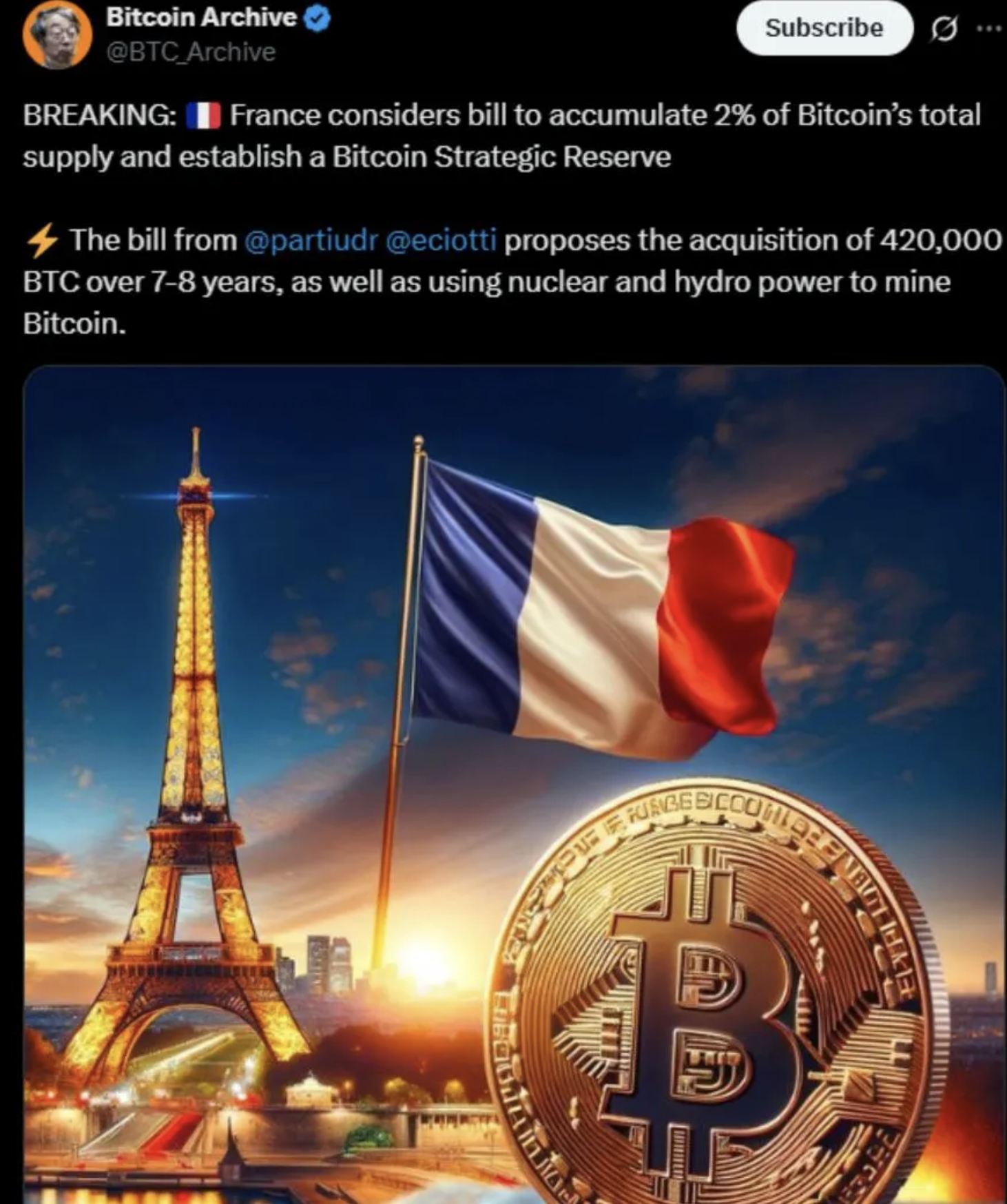You know what? France is contemplating a real shift in its crypto policy, and it could change the game for all of Europe. Essentially, a bill from the Union of the Right for the Republic (UDR) proposes to create a national Bitcoin reserve that could reach 420,000 BTC. Yes, you read that right, 420,000! That represents about 2% of all the Bitcoin circulating in the world.
And the crazy thing is that this reserve wouldn't happen overnight. No, they’re talking about a plan over 7 to 8 years, with a mix of public purchases, mining, and well-thought-out investment strategies. If it happens, France would be the first European country to possess a massive state Bitcoin reserve. Honestly, it completely changes the vision one can have of the national economy.
The Bitcoin reserve: between innovation and sovereignty
Éric Ciotti and his colleagues envision something long-term and stable. No speculative hits on the fly. The idea is that Bitcoin purchased or mined remains under state control, like a strategic reserve to protect against economic uncertainty and strengthen monetary sovereignty.
And where it gets interesting is that they want to use France's renewable energy—nuclear and hydraulic—to power the mining. So, instead of wasting this energy, we're turning it into strategic digital assets. It’s a bit like your surplus electric heating earning you Bitcoins overnight... practical, right?
This strategy is not just bold from a financial standpoint. It also has a real geopolitical and economic impact. By anchoring part of its reserves in Bitcoin, France positions itself as a pioneer in alternative monetary strategies, reducing its dependence on the dollar. And let’s face it, it shows that Bitcoin is increasingly seen as a safe haven and a shield against inflation or global financial crises.
On the other hand, the digital euro? Not anytime soon
At the same time, lawmakers remain skeptical about the digital euro proposed by the ECB. Why? Because this kind of centralized currency could give too much control to the authorities: surveillance, restrictions, or even freezing accounts... in short, a bit scary if you care about your financial freedom. One can say that France prefers decentralized solutions, like Bitcoin and stablecoins, rather than CBDCs that risk curtailing citizens' freedom.
And then, even though the ECB has been working on it for two years, the launch is only expected around 2029. So, France is positioning itself in a real philosophical debate: how to reconcile innovation, privacy, and regulatory oversight? And that’s a topic that will become increasingly heated with blockchain disrupting traditional finance.
Stablecoins in euros: the other battleground
But France isn't stopping at Bitcoin. It also wants to boost stablecoins in euros. You know, those digital currencies that maintain the value of the euro and allow for quick transactions. Why? Because the market is still dominated by the dollar with coins like USDT or USDC. And honestly, it feels a bit unbalanced for Europe.
Moreover, the project encourages the European Commission to relax MiCA rules so that institutions can issue these stablecoins more easily. Thus, it could become a real driver for international transactions, corporate treasury, and institutional investments. Europe would finally become competitive in the global crypto market.
And what about the crypto industry in France?
This Bitcoin reserve falls right in line with a push to strengthen the French crypto ecosystem. The AMF gives the green light to new companies, like Hexarq for custody and trading, or Lise Exchange for tokenized shares.
In parallel, the ACPR monitors large exchanges like Binance and Coinhouse to ensure compliance with anti-money laundering and KYC rules. And you know what? According to Chainalysis, France processed about 180 billion dollars in crypto last year. Not bad, huh? It shows that the market is active and that institutions are ready for broader integration.

France between innovation and sovereignty
To sum it up, France says “yes to Bitcoin, no to the centralized digital euro.” It’s a real balance between innovation, sovereignty, and regulatory caution. With this state reserve, it reduces its dependence on traditional currencies, diversifies its wealth, and aligns itself with the global trend towards digital.
Thus, it could serve as a model for other European countries and spark debates on monetary policies, cross-border transactions, and the integration of blockchain into administrations.
When energy and finance meet
The mining project with renewable energy is also very strategic. Transforming nuclear and hydraulic energy into useful Bitcoin is about making profitable what would be lost and aligning it with global financial innovation. In short, it’s a real example of sustainable development applied to finance.
Privacy and control
Where it gets interesting is the question of privacy. CBDCs promise efficiency, but they monitor everything. France, on the other hand, prefers Bitcoin and stablecoins to protect the financial autonomy of its citizens. It’s a true philosophical choice that places the country on the side of individual freedom in an ultra-digitized world.
Global and institutional impacts
If France really adopts a Bitcoin reserve, it could inspire other central banks and encourage institutional investment. The stablecoins in euros would strengthen the European market and promote private investments in blockchain infrastructure. In short, Europe shows that it can embrace digital while remaining regulated.
And what next?
We are at a turning point. If all this materializes, France could become a reference in Europe for the sovereign adoption of crypto, combining innovation, environmental protection, and financial security. It’s not every day you see a country thinking about crypto at this scale!
In summary, France is seriously exploring Bitcoin, green mining, and stablecoins in euros. It’s a model for other nations, and it could completely change the global perception of digital assets. So, if you’re following crypto news, keep your eyes open: Europe could well become a real blockchain hub in the coming years.


